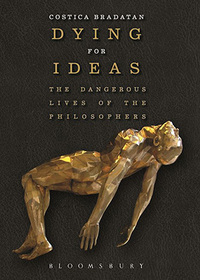
- Texas Tech University; University of Queensland, Australia
- Professor of Humanities; Honorary Research Professor of Philosophy
- Affiliation During NDIAS Fellowship: Texas Tech University
- Residential Fellow (2012-2013)
- "Philosophy as an Art of Dying"
Costica Bradatan is Professor of Humanities in the Honors College at Texas Tech University, USA, and an Honorary Research Professor of Philosophy at University of Queensland, Australia. He has also held faculty appointments at Cornell University, Miami University, University of Wisconsin-Madison, and Arizona State University, as well as at several universities in Europe and Asia.
Bradatan is the author and editor of ten books, among which Dying for Ideas: The Dangerous Lives of the Philosophers (Bloomsbury, 2015) and In Praise of Failure (forthcoming with Harvard University Press). His work has been translated into many languages, including Dutch, Italian, Chinese, Vietnamese, and Farsi.
He has also written book reviews, essays, and op-ed pieces for such publications as The New York Times, The Washington Post, Times Literary Supplement, Aeon, Dissent, The New Statesman, and other similar venues. Bradatan serves as the Religion/Comparative Studies Editor for the Los Angeles Review of Books, and is the founding editor of two book series: “Philosophical Filmmakers” (Bloomsbury) and “Philosophy beyond Boundaries” (Columbia University Press).
Photo of Costica Bradatan by Bram Budel.
Publications
-
Dying for Ideas: The Dangerous Lives of the Philosophers
Bloomsbury, 2015

What do Socrates, Hypatia, Giordano Bruno, Thomas More, and Jan Patocka have in common? First, they were all faced one day with the most difficult of choices: stay faithful to your ideas and die or renounce them and stay alive. Second, they all chose to die. Their spectacular deaths have become not only an integral part of their biographies, but are also inseparable from their work. A “death for ideas” is a piece of philosophical work in its own right; Socrates may have never written a line, but his death is one of the greatest philosophical best-sellers of all time.
Dying for Ideas explores the limit-situation in which philosophers find themselves when the only means of persuasion they can use is their own dying bodies and the public spectacle of their death. The book tells the story of the philosopher’s encounter with death as seen from several angles: the tradition of philosophy as an art of living; the body as the site of self-transcending; death as a classical philosophical topic; taming death and self-fashioning; finally, the philosophers’ scapegoating and their live performance of a martyr’s death, followed by apotheosis and disappearance into myth.
While rooted in the history of philosophy, Dying for Ideas is an exercise in breaking disciplinary boundaries. This is a book about Socrates and Heidegger, but also about Gandhi’s “fasting unto death” and self-immolation; about Girard and Passolini, and self-fashioning and the art of the essay.